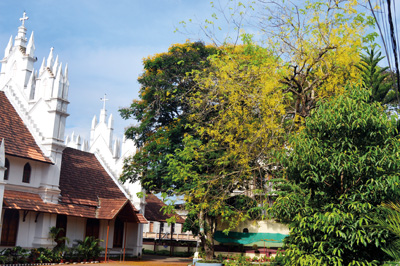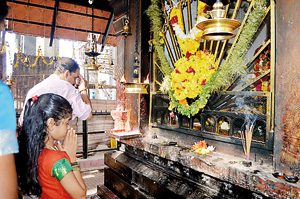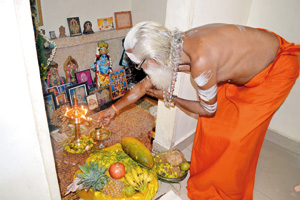New beginnings

Ahala flowers in full bloom in Kottayam Pix courtesy Aanya Wipulasena
When the Golden Shower Trees (Ahala Flowers) are in full bloom it only means one thing to Hindus in Kerala, like the call of the Asian Koel (Koha) to Sri Lankans the bright yellow flowers represent the dawn of a new year – Vishu.
Vishu is the start of the Malayalam Zodiac year and is celebrated in every Hindu house in Kerala and considered to be an auspicious event. With the day filled with an abundance of fruits and vegetables along with visits to relatives’ houses these Malayalese embark upon another year with hopes for prosperity and happiness.
The Kerala New Year takes place a day after Sri Lanka celebrated its one on April 15. All Malayalese believe that getting a good start is crucial and this applies especially to how they commence their year. We were fortunate to be invited to experience the festivities first hand when S. Nair extended an invitiation to celebrate this auspicious event in his Malayali home.

Girl at a temple
When we visited Mr. Nair’s house he had already completed the most interesting custom of Vishu- Vishukani or Kani Kanal which translate from Malayalam into ‘first sight on Vishu’. It is believed that seeing good things as you open your eyes in the daybreak of the New Year can dictate how you spend the rest of the year.
To ensure that they see objects that will bring prosperity and good luck a prescribed list of items is placed in a prominent place of the house. “Vishu is also the festival for harvesting. So the items that we place in our Vishukani were what our famers used to harvest in Kerala. They were cucumber, mangoes, bananas, halved jack fruits, halved coconuts and rice.
But now things have changed we see people having apples, grapes and oranges in their Vishukani basket which are not even grown in this part of the country,” said Mr. Nair who is a grandfather. As we stepped into Mr. Nair’s house we saw the Vishukani decorated with yellow ahala flowers and an oil lamp still burning brightly.
We saw that theVishukani basket also consists of gold ornaments, a fresh white cloth, a cadjan leaf book or the Bhagavad-Gita symbolizing knowledge, a mirror and of course a bunch of Golden Shower Tree flowers and a coconut oil lamp which illuminated light into the mirror. All these items are placed in front of an idol of Lord Shree Krishna.

Mr Nair lights an oil lamp
“When we were children my mother would come into our room early in the morning to wake us up and she would cover our eyes and take us to where the Vishukani is kept. She will make sure that the Kani is what we see first and foremost,” said Shalini N. who is studying in Kottayam.
When people look into the Vishukani, they not only see the golden luster of the fruits and the jewellery but also a reflection of themselves in the mirror implicating that the one that looks into the Vishukani is also a part of the prosperity of the upcoming year. According to the Kerala customs this Vishukani is first offered to Lord Krishna and then distributed among the poor.
Gold is a very important aspect during the festival. It symbolizes monetary, cultural and spiritual wealth. So after this auspicious start, elders distribute a small amount of money to the eagerly awaiting children. The custom known as Vishu Kaineetam is believed to bring prosperity to the children. We are told that wealthy people give money to their relatives, neighbors and also the village temple to spread the good fortune.
Happily sitting in the living room and eagerly explaining the importance of the day he invited us for breakfast. His daughter brought in a platter of idli and sambar (a traditional breakfast in South India). “Today is a very important day for us and we treat our visitors like God. If they are happy then we are blessed with a good year,” Mr. Nair said smiling.True to his word he insisted that we have a second round of delicious idlis.
As we ate Mr. Nair explained that Vishu customs had changed over the years but the spirit of Vishu is still in its prime.
He said Vishu celebrations are completed with a visit to the temple and offering homage to the gods. Some people even travel for miles to visit a prominent temple with their family members and neighbours. Women dress in a Kerala saree, young girls in a long skirt and a simple top while men stick to a light coloured shirt and sarong, the Malayalese go to the temples.
“It is easily the most auspicious event in the year. We celebrate it with all our hearts and we encourage our children to do so too. There are Malayalese who leave Kerala and settle in other parts of the country but they too ensure that they celebrate this day as well as they can and spread its goodness among others as well,” he said.
After a hearty meal and spending a memorable day with Mr. Nair and his family we finally take our leave with high hopes for the new year as we head back home.


